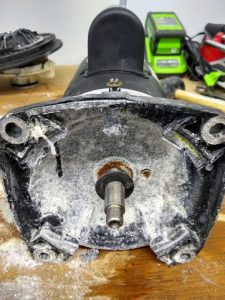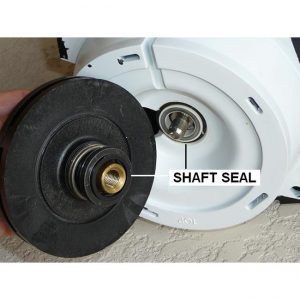There are several reasons why a pump motor might quit working. When and how you installed your motor will help determine what the issue is.
4 (Possible) Reasons Your Pump Motor Stopped Working
1. Your Pump Shaft Seal Failed
One of the most common reasons for pump motor failure is water damage. Inside your pump is a shaft seal. The shaft seal is a two-piece, spring-loaded seal that protects your motor from water damage. However, if this seal is compromised or if you install it incorrectly, water may get through and damage your motor.
If you are unaware that your shaft seal is leaking, it can possibly lead to corrosion along the front face of your motor and you don’t want that. Water damage is actually one of the few things the manufacturer checks when submitting your motor warranty. In my experience, water damage is the leading cause of denied warranties.
-

Example of Water Damage -

Where You Find The Seal
To protect your motor and preserve your warranty, we recommend replacing all of your seals, but especially the shaft seal, whenever you replace your motor. Also, if you notice that your pump is leaking, inspect it immediately. The longer you wait, the worse the leak will get.
2. Bad Capacitor
Buzzing Or Humming Noises
Have you ever tried turning on your pump but instead was met with a soft humming or buzzing noise? This noise will usually continue until it trips the breaker. In this case, the culprit is probably your capacitor.
The capacitor is a small part that looks similar to a battery. They are typically only good for around 5000 starts before they go bad. So, if you’ve had your motor for a long time and now it won’t start, the capacitor may be the issue.
Burnt Electrical Smell
In addition to a buzzing noise, another way to determine if the capacitor is bad is by using your sense of smell. If you start your pump and get a burnt electrical smell, your capacitor may be bad.
Only ONE Speed Works On a Two-Speed Motor
There are a few reasons why a pump motor will run on one speed and not the other. Yes, one reason is a bad run capacitor. If you replace the capacitor and it does not solve the issue, you will probably need to replace your motor.
Overheating
A defective run capacitor can cause the motor to run at a higher amperage, causing the motor to overheat. However, it’s not the only reason your motor may be overheating.
The surest way to determine if your capacitor is bad is by testing it, of course. Other causes of a pool motor overheating would be an oversized impeller, bad windings, or high voltage.
3. Wired Motor Incorrectly
If you wire your motor incorrectly, the best-case scenario is it won’t start. The worst-case scenario is you ruin the motor. Hence why it is so important that you wire it correctly.
First, make sure your motor is set to the correct voltage BEFORE running the motor. Using the wrong voltage may result in motor failure. Next, ensure that your wires are placed in the proper positions. Please refer to the motor wiring diagram on the motor label.

4. Your Motor Is Dead
Before you go any further, ask yourself, “How long have I had my motor?” I’ll be honest, the life-span and longevity of pump motors have drastically decreased. Before, I used to run into pool owners who’ve been using the same motor for 5-10 years. Now, most pool owners get merely 1-5 years.
I’m uncertain if the quality of the motor has decreased or if environmental factors have played a role. However, if you’ve had your motor for a few years and it recently stopped working and none of the above solutions apply to you, you may just need to replace the motor.
If you have any other questions about pool and spa products please do let us know - we are here to help!

